Ducks are part of the waterfowl family, which allows them to thrive on land, water, and air. As a result, it seems like they have plenty to do all day.
Most ducks alternate between sleeping on land and water depending on the seasons, but some breeds prefer only sleeping on land. Interestingly, ducks do not spend the entire night sleeping since they also use the time to groom themselves, eat, or socialize with other ducks.
But that’s not the only thing that’s interesting about ducks and sleep. They’re also capable of sleeping with half an eye open to keep an eye out for potential predators. How are they able to do that?
Do Ducks Sleep?
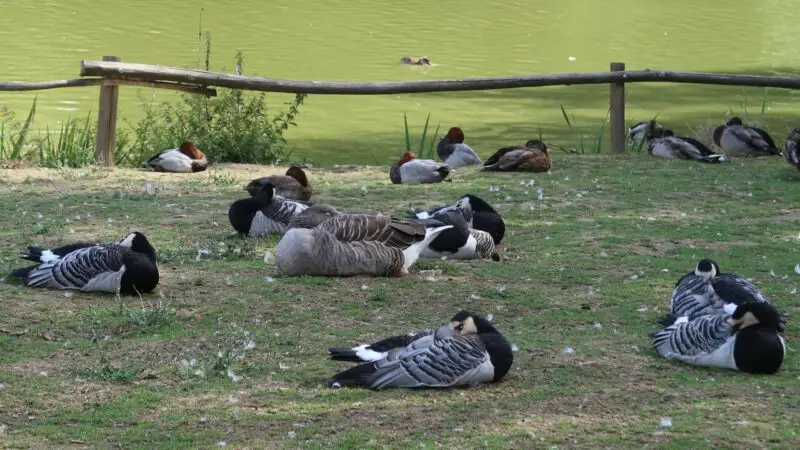
Ducks do sleep. However, it’s not the kind of sleep that lasts all night.
Unlike most birds, ducks are semi-nocturnal beings. And being semi-nocturnal, they neither sleep all day nor sleep all night. Instead, they sleep at small intervals throughout the day.
The reason behind their semi-nocturnal lifestyle is the fact that they are vulnerable to predators. They have to stay vigilant to ensure survival, and that means taking naps to have enough energy to flee at any time they feel like they’re in danger.
But perhaps one of the most interesting things about ducks is that they are capable of unihemispheric sleep. Unihemispheric slow-wave sleep (USWS or unihemispheric sleep) is a phenomenon where only half of the brain rests while the other half stays awake and alert. This unique way of sleeping is only common among a few species of animals like ducks, dolphins, and whales, to name a few.
Because of USWS, ducks can sleep with one eye open to continue monitoring their surroundings while getting some rest. Now that’s something to be envious of.
When Do Ducks Sleep?
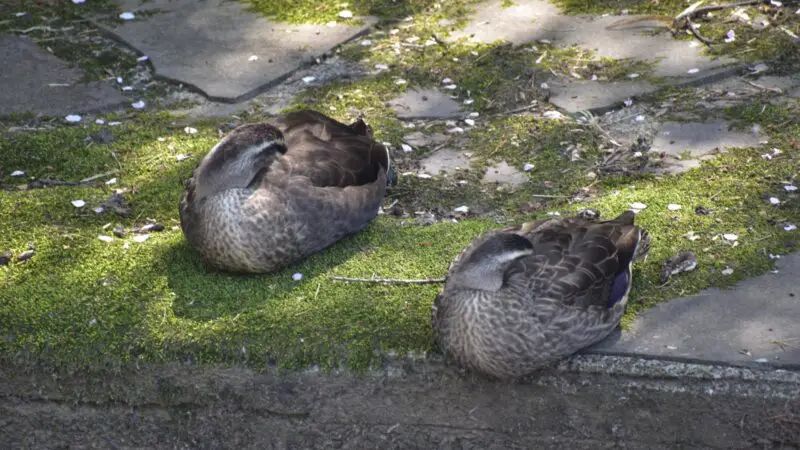
Ducks sleep in short intervals throughout the day but sleep longer during the night. During the day, they rest to have enough strength to look for food and in case they have to flee the area. On the other hand, they sleep longer at night because most of their predators are likewise asleep during this time.
What Does a Duck Sleep Schedule Look Like?
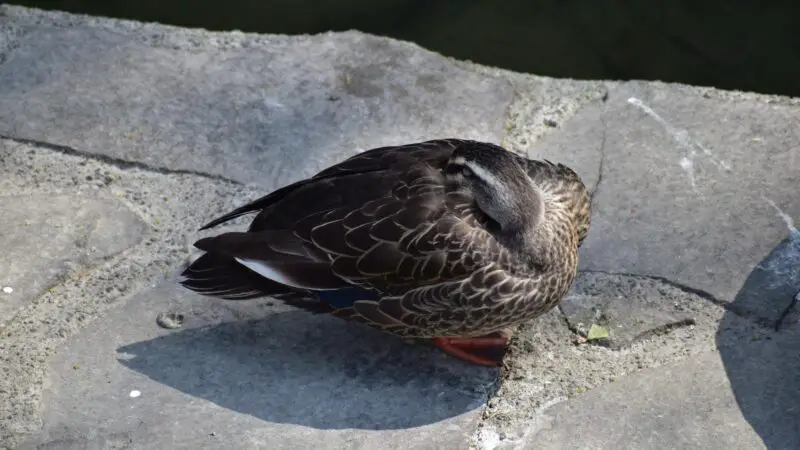
A duck’s sleep schedule is quite flexible. They do not have specific times of the day when they have to go to sleep. They simply rest whenever they feel like it – and regardless of how long or how short the nap is.
However, it is observed that ducks have a pattern before they go to sleep. They start by searching for food or foraging, which is followed by bathing. After bathing, they groom themselves by cleaning their feathers in a process called preening. Once they’re full and clean, it’s finally time to sleep.
How Do Ducks Sleep?
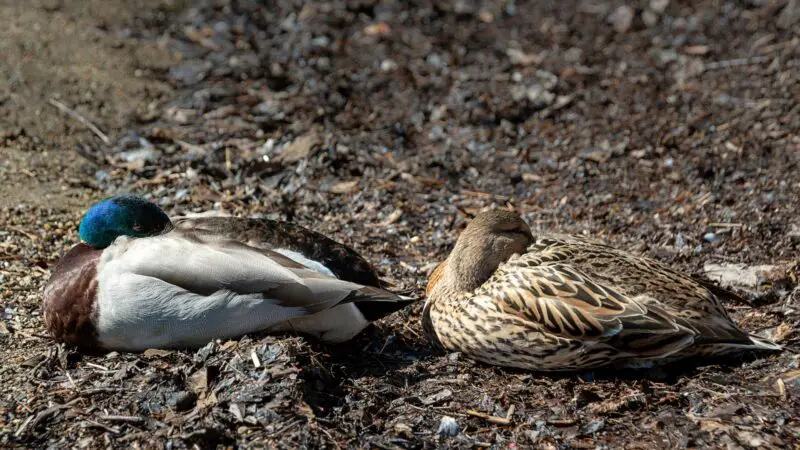
If you’ve ever seen a duck sleeping, you’ll notice that it has an iconic head-tucked-back position. This is common among ducks and is resorted to for a few reasons.
The first reason is that it allows them to rest their necks while they sleep – much like how you use pillows to sleep comfortably. The second reason for sleeping in this position is that it helps them stay alert in case a threat comes close to them.
Because their head is tucked under their wing, they become more sensitive to their surroundings. This is especially true among wild ducks who prefer to sleep while floating on water.
Another reason for this position is that it allows them to save their body heat. That’s especially helpful when they’re sleeping in the cooler months.
Speaking of conserving their body heat, you may also notice that some ducks tend to sleep with one foot tucked under their feathers. This is called uni-pedal resting and is their means to thermoregulate during the cold seasons. Through this position, the other foot stays warm under the feathers to prevent further loss of body heat.
Do Ducks Sleep With Their Eyes Open?
Ducks sleep with one eye open. They are capable of unihemispheric sleep, which allows half of their brain to stay awake while the other half rests. Simply stated, the open eye is connected to the side of the brain that’s alert, while the closed eye is connected to the side of the brain that’s asleep. That’s how they can do both at the same time.
The ability to sleep with an eye open is an evolutionary trait that stems from the fact that ducks have to protect themselves from predators. It’s the same reason why ducks sleep more comfortably in groups.
Speaking of sleeping with one eye open, studies reveal that this ability helps ducks in protecting their group against danger. It shows that ducks tend to sleep in a row, and those positioned at opposite ends are the ones who sleep with an eye open. On the other hand, those in the middle can sleep with both eyes closed.
Interestingly, ducks also take turns in who gets to sleep at the ends of the row to keep an eye out for the team. And this impressive teamwork is how ducks survive in the wild for years.
How Long Do Ducks Sleep?
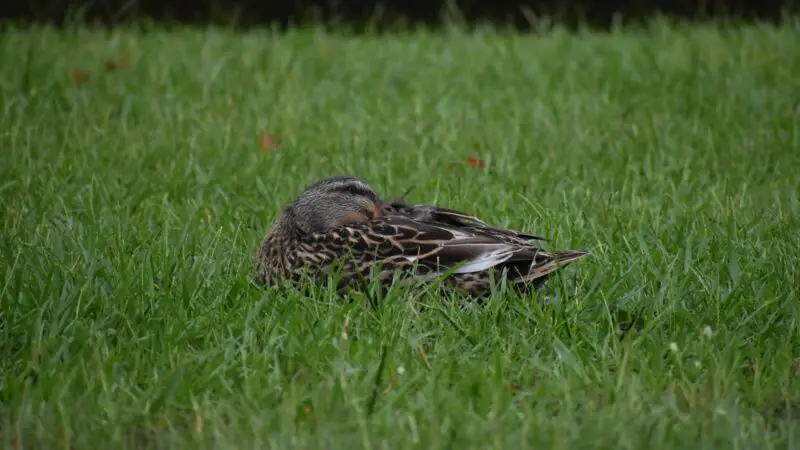
Ducks sleep an average of 10.8 hours per day but not all at once. As previously discussed, these birds prefer to take naps throughout the day, which can be a few hours at a time. This is resorted to so they can have enough energy to gather food or migrate.
While most of their sleeping hours happen at night, ducks still manage to stay relatively active during this time. It is interesting to note that while ducks have impressive eyesight during the day, they don’t see well once the darkness has set. That’s why they sleep longer at night but still wake up once in a while for simple activities like grooming, socializing, or both.
Can Ducks Sleep While Swimming?
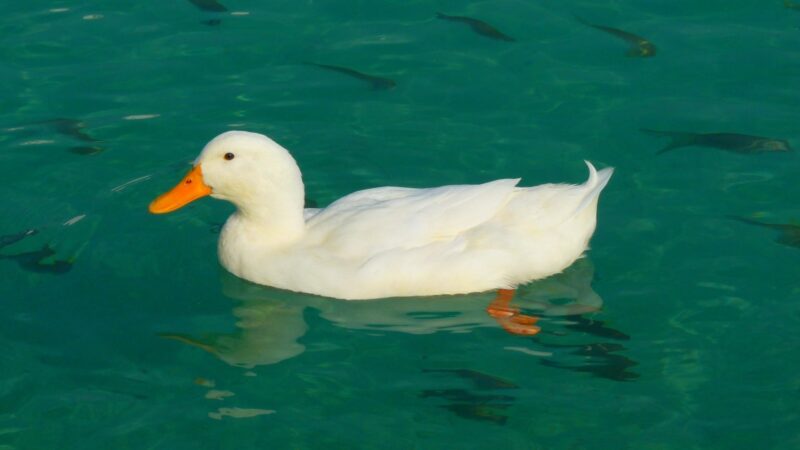
Some duck breeds can sleep while on water. However, they do not exactly swim while they’re asleep. They simply float.
Floating while asleep is possible since ducks have feathers that trap enough air to keep their bodies afloat. It also helps that ducks are quite lightweight.
In the case of wild ducks, sleeping while floating allows them to detect if danger is lurking underwater. The predator often creates underwater ripples that could instantly signal ducks to run away. This is especially true in bodies of water like ponds or lakes.
Farm Ducks Vs. Wild Ducks
In terms of sleep, there is a distinction between the sleep habits of farm ducks as opposed to wild ducks.
Wild ducks can either sleep on water or land. They have also developed sleep habits that allow them to survive in an environment where they have to be prepared in case danger lurks nearby.
On the other hand, farm ducks often sleep in an enclosed coop or duck house. This gives them a certain level of security since it keeps them safe from predators. And even if you don’t have a pond on your farm, a small pool of water is enough to keep these domesticated ducks happy.
But one thing is common between farm and wild ducks. They’re both not picky about where they sleep. You don’t have to build your farm ducks a nest or a roosting perch. As long as they have enough space and straws on the floor to sleep comfortably, farm ducks will surely rest well.
Frequently Asked Questions
Do Ducks Sleep a Lot?
Ducks sleep a lot. Although ducks do not sleep all night long, they do sleep at small intervals all day. Sleep takes around 45 percent of a duck’s 24-hour schedule, roughly 10.8 hours of sleep.
How Many Hours Do Ducks Sleep?
On average, ducks sleep for about 10.8 hours per day. As earlier discussed, these 10 hours are scattered throughout the day, between active wake times for feeding and grooming.
Do Ducks Sleep Like Chickens?
Ducks do not sleep like chickens. To start, chickens sleep all night, while ducks are semi-nocturnal and only sleep for a few hours at night. Also, chickens are known to sleep on roosting perches or nesting boxes, while ducks can sleep on water or the ground.
However, they do have something in common. Both chickens and ducks can sleep with an eye open. This unique sleep ability allows them to stay alert in case of an attack while they are asleep.
Why Do Ducks Turn Their Heads When Sleeping?
Ducks turn their heads in an iconic sleeping position to relax their neck muscles. Ducks also tuck their heads under their wings to conserve their body heat as they sleep. And in the case of ducks who prefer to sleep while floating on water, this position helps them detect underwater movement to help them flee predators.
Ducks have one of the most interesting sleep habits in the animal kingdom. It’s truly fascinating how they can keep half of their brain active with one eye open as they sleep. And in some instances, they even do so while floating on water. They also sleep in groups that help protect each other in case of danger.
List of Sources
Bird-Brains Stay Alert While Ducks Sleep
How Do Birds Keep Warm in the Winter?
Revisiting the Evolutionary History of Domestic and Wild Ducks Based on Genomic Analyses
